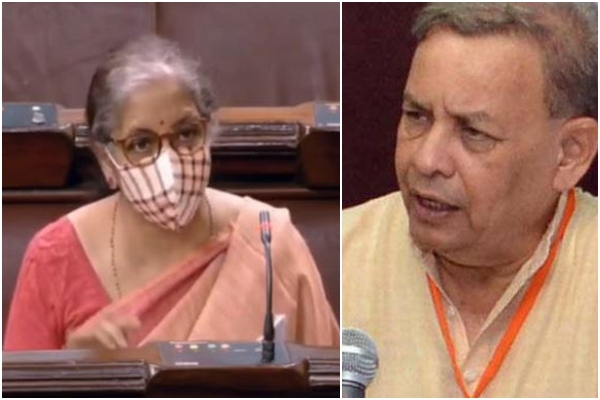New era of stronger Urban CoOp Banking Sector, Satish Marathe lauds passage of Banking Regulation (Amendment) Bill
Total Views |
New Delhi, September 23: The Rajya Sabha on Tuesday passed the Banking Regulation (Amendment) Bill, 2020 after it was cleared by the lower house of parliament last week. The bill was introduced earlier this year in March by Finance Minister Nirmala Sitharaman to avoid another Punjab and Maharashtra Co-operative Bank like crisis.
"During the COVID period, many co-operative banks have come under stress. 277 Urban co-operative banks are reporting losses, 105 are unable to meet minimum regulatory capital requirements", said the Finance Minister in her reponse. Also Founder Member of Sahakar Bharati, Director RBI, Director NCDC, Satish Marathe happened to welcome the passage of Banking Regulation (Amendment) Bill by the Parliament.

"This is the beginning of a new era of a stronger Urban CoOp Banking Sector. Thanks to Prime Minister Narendra Modi, Finance Minister Nirmala Sitharaman and RBI Governor Shaktikanta Das", he tweeted.
I welcome passage of Banking Regulation Amendment Bill by the Parliament.
— Satish Marathe (@Satish_Marathe1) September 22, 2020
This is the beginning of a new era of a stronger Urban CoOp Banking Sector.
Thanks to Hon @narendramodi ji @PMOIndia, Hon @nsitharaman ji @FinMinIndia & Hon @DasShaktikanta Guv @RBI #UCB #Coop pic.twitter.com/Pikof83Wvt
Replacing the Banking Regulation (Amendment) Ordinance, 2020, the allows RBI to initiate a scheme for reconstruction or amalgamation without imposing a moratorium. If a moratorium is imposed, in addition to the existing restrictions, the Bill adds that banks cannot grant any loans or make investments in any credit instruments during the moratorium. Here is more what the actual bill says-
Issuance of shares and securities by co-operative banks: The Bill provides that a co-operative bank may issue equity, preference, or special shares on face value or at a premium to its members or to any other person residing within its area of operation. Further, it may issue unsecured debentures or bonds or similar securities with maturity of ten or more years to such persons. Such issuance will be subject to the prior approval of the RBI, and any other conditions as may be specified by RBI.
The Bill states that no person will be entitled to demand payment towards surrender of shares issued to him by a co-operative bank. Further a co-operative bank cannot withdraw or reduce its share capital, except as specified by the RBI.
Qualifications for management: The Bill applies certain provisions of the Act to co-operative banks in relation its management. Under the Bill, co-operative banks cannot employ as Chairman, someone who is insolvent or has been convicted of a crime involving moral turpitude, among other restrictions. RBI may remove the Chairman if he is not fit and proper and appoint a suitable person if the bank does not do so.

Further, the Board of Directors must have at least 51% of members with special knowledge or experience in areas such as accountancy, banking, economics or law. RBI may direct a bank to reconstitute its Board if it does not conform to the requirements. If the bank does not comply, RBI may remove individual directors and appoint suitable persons.
Power to exempt cooperative banks: The Bill states that RBI may exempt a cooperative bank or a class of cooperative banks from certain provisions of the Act through notification. These provisions relate to restrictions of certain types of employment, qualifications of the Board of Directors and, appointment of a chairman. The time period and conditions for the exemption will be specified by RBI.
Supersession of Board of Directors: The Act states that RBI may supersede the Board of Directors of a multi-state co-operative bank for up to five years under certain conditions. These conditions include cases where it is in the public interest for RBI to supersede the Board, and to protect depositors. The Bill adds that in case of a co-operative bank registered with the Registrar of Co-operative Societies of a state, RBI may supersede the Board of Directors after consultation with the concerned state government, seeking their comments within such period as specified by it.
Certain provisions omitted: The Bill omits certain provisions from the Act. One of them relates to a restriction on a co-operative bank from making loans or advances on the security of its own shares. Further, it prohibits the grant of unsecured loans or advances to its directors, and to private companies where the bank’s directors or chairman is an interested party. The Act also specifies conditions when unsecured loans or advances may be granted and specifies the manner in which the loans may be reported to RBI. The Bill omits this provision from the Act.
Also Read-

